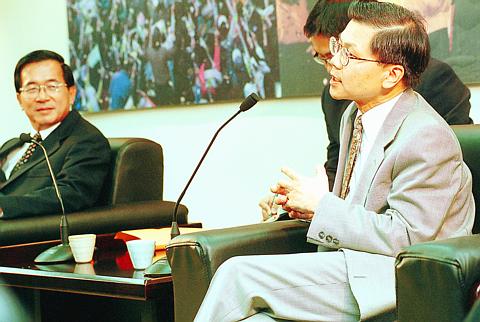After congratulating President-elect Chen Shui-bian (
Chen also said he hoped biotechnology could function "as a bridge between the US, China and Taiwan, and that it could lead to cross-strait peace and common Asia-Pacific interests."
Chen invited Ho, currently on a visit to Taiwan, to assist Taiwan in developing biotechnology.

PHOTO: CHEN CHENG-CHANG, TAIPEI TIMES
Ho, considered good friend of Chen's and a member of Academia Sinica, said: "biotechnology is important to Taiwan, and I am happy to provide an advisory service."
However, Ho said since Chen had not yet made any formal request regarding the appointment, he could not say more for the moment.
Chen said he had recently talked with Academia Sinica president Lee Yuan-tseh (
Chen said Ho and Lee would meet at a later later to talk more about the issue. In addition, Chen said, he would formally invite Ho to take the position of head advisor after the presidential inauguration on May 20.
"I would like to turn Taiwan into a manufacturing and service center for biotechnology," Chen said.
Ho said three conditions are necessary for the development of biotechnology. First, he said, talent was the most important factor.
"A critical mass of talent is required to develop biotechnology," Ho said, adding that there is a lot of overseas and domestic talent in this field.
Secondly, he said the government should get involved in facilities and funding, to show its strong commitment to this goal. And third, he said, private donations were also crucial in ensuring continued funding.
Flashing his trademark boyish smile, Ho emphasized that he visited Chen just to say "hello" and to offer congratulations yesterday.
Chen, however, said he hoped Ho could dedicate himself to his home country in the future.
Ho was born in Taichung in 1952 and left for the US at the age of 12. He returned to Taiwan in 1996 after he was chosen as Time magazine's Man of the Year for 1996, in recognition of his revolutionary work in drug therapies to combat AIDS.

INVESTIGATION: The case is the latest instance of a DPP figure being implicated in an espionage network accused of allegedly leaking information to Chinese intelligence Democratic Progressive Party (DPP) member Ho Jen-chieh (何仁傑) was detained and held incommunicado yesterday on suspicion of spying for China during his tenure as assistant to then-minister of foreign affairs Joseph Wu (吳釗燮). The Taipei District Prosecutors’ Office said Ho was implicated during its investigation into alleged spying activities by former Presidential Office consultant Wu Shang-yu (吳尚雨). Prosecutors said there is reason to believe Ho breached the National Security Act (國家安全法) by leaking classified Ministry of Foreign Affairs information to Chinese intelligence. Following interrogation, prosecutors petitioned the Taipei District Court to detain Ho, citing concerns over potential collusion or tampering of evidence. The

‘FORM OF PROTEST’: The German Institute Taipei said it was ‘shocked’ to see Nazi symbolism used in connection with political aims as it condemned the incident Sung Chien-liang (宋建樑), who led efforts to recall Democratic Progressive Party (DPP) Legislator Lee Kun-cheng (李坤城), was released on bail of NT$80,000 yesterday amid an outcry over a Nazi armband he wore to questioning the night before. Sung arrived at the New Taipei City District Prosecutors’ Office for questioning in a recall petition forgery case on Tuesday night wearing a red armband bearing a swastika, carrying a copy of Adolf Hitler’s Mein Kampf and giving a Nazi salute. Sung left the building at 1:15am without the armband and apparently covering the book with a coat. This is a serious international scandal and Chinese

Seventy percent of middle and elementary schools now conduct English classes entirely in English, the Ministry of Education said, as it encourages schools nationwide to adopt this practice Minister of Education (MOE) Cheng Ying-yao (鄭英耀) is scheduled to present a report on the government’s bilingual education policy to the Legislative Yuan’s Education and Culture Committee today. The report would outline strategies aimed at expanding access to education, reducing regional disparities and improving talent cultivation. Implementation of bilingual education policies has varied across local governments, occasionally drawing public criticism. For example, some schools have required teachers of non-English subjects to pass English proficiency

TRADE: The premier pledged safeguards on ‘Made in Taiwan’ labeling, anti-dumping measures and stricter export controls to strengthen its position in trade talks Products labeled “made in Taiwan” must be genuinely made in Taiwan, Premier Cho Jung-tai (卓榮泰) said yesterday, vowing to enforce strict safeguards against “origin laundering” and initiate anti-dumping investigations to prevent China dumping its products in Taiwan. Cho made the remarks in a discussion session with representatives from industries in Kaohsiung. In response to the US government’s recent announcement of “reciprocal” tariffs on its trading partners, President William Lai (賴清德) and Cho last week began a series of consultations with industry leaders nationwide to gather feedback and address concerns. Taiwanese and US officials held a videoconference on Friday evening to discuss the